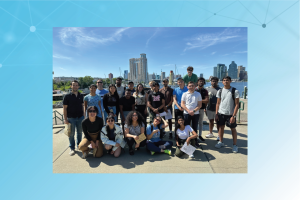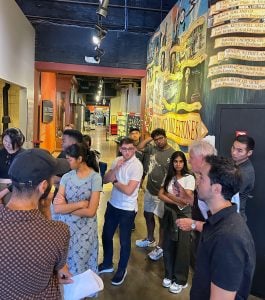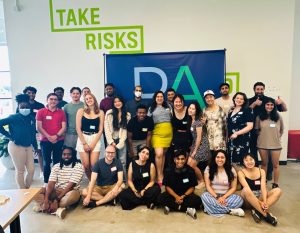
On May 22, more than 20 students bonded over ice cream, brainstorming and sharing plans and goals for their startups, during the kickoff of the third annual summer incubator at the Pava Marie LaPere Center for Entrepreneurship.
This unique program provides student founders with a six-week sprint to build their startups, attend workshops on fundamental entrepreneurship skills, form connections with alumni and mentors, and establish a foundation in Baltimore’s entrepreneurial ecosystem.
This year, 19 teams are represented. Their founders work in-person at the Pava Marie LaPere Center and receive a generous stipend to support their efforts. The goal of the stipend is for students to fully immerse themselves in their startups without needing to worry about taking on other employment. The generosity of the center’s alumni and friends makes this all possible.
Over 80 teams applied to participate in the six-week program, and the ventures represent a diverse range of industries from health care to photography.
Throughout the six weeks, the Pava Marie LaPere Center is hosting nearly 20 workshops, guests and other events to connect students with the networks and knowledge to succeed in their industries. Highlights include:
- Legal workshop led by Kreiger School of Arts & Sciences alum Sam Eichner from law firm Pillsbury Winthrop Shaw Pittman
- Field trip to the Baltimore Museum of Industry
- Three collaborative sessions with area university entrepreneurship programs at Towson University and the University of Maryland
- Over a dozen Pava Marie LaPere Center alum (Fuel, President’s Venture Fellowship, Social Innovation Lab (SIL) and Innovation & Entrepreneurship awardees)
- Christy Wyskiel, senior adviser to the president of The Johns Hopkins University for innovation and entrepreneurship
PARTICIPATING VENTURES
- Academic AI (Acai), led by Surya Pandiaraju, is a platform that provides students and educational institutions with automated services, information centralization, and an AI (Artificial Intelligence)-powered matchmaking system to streamline admissions and facilitate decision-making.
- AlgaeWorks, led by John Carbo, aims to grow structural materials for the construction industry using algae and enzymatic processes.
- Cerebrally, led by Helene Huang, will leverage research in nanoscale “connectomics” and active electric/electromagnetic stimulation of neural systems to develop a bidirectional in vitro brain-computer interface.
- Commuticate, led by Mark Faust, is the first purely proactive solution to driver fatigue through engaging conversation and wordplay.
- Deepnosis, led by Elham Jamshidi, is an AI-driven startup focused on enhancing medication safety by predicting adverse drug reactions with personalized precision.
- Eloquia, led by Aditya Kondepudi, is a digital platform powered by machine learning to aid people with speech impediments and those seeking to enhance their speech fluency.
- Flow Genius, led by Deanna Susser, is committed to empowering people who are neurodivergent through an innovative planner designed with empathy and understanding.
- GooseCart, led by Muxi Lyu, is a community-centric platform that bridges the gap between app users and food deliveries within local settings to eliminate delivery fees
- GymJewels, led by Kristin Cornish, is a silicone jewelry holder for female athletes to prevent jewelry from becoming lost or tarnished.
- Hana, led by Clara Jeon, is a digital space that allows infinite customization to create gifts that will last forever.
- HerWai, led by Enzo Ochoga, is a health care solution app for underrepresented women that is designed with cultural sensitivity.
- Oratio, led by Daniel Nashed, aims to bridge the communication barrier between people who are deaf and people who are not deaf by leveraging cutting-edge AI assistive technology through a mobile application.
 Protice, led by Aryan Waghmode, aims to return competition and transparency to the health care industry through its groundbreaking marketplace in which patients can tailor their insurance plans, much like choosing components for car insurance.
Protice, led by Aryan Waghmode, aims to return competition and transparency to the health care industry through its groundbreaking marketplace in which patients can tailor their insurance plans, much like choosing components for car insurance.- RectaNav, led by Zach Gold, is a high-tech medical device for improved navigation and visualization during rectal catheter insertion for trans anal irrigation.
- Ryo, led by Roy Randen, is a mobile payments app that facilitates remittance transfers from U.S.-based migrant workers and international students to their families in the Global South.
- StudioGheebs, led by Ragheeb Moazzem, is a film camera company that provides a comprehensive platform for enthusiasts and professionals and facilitates connections to repair shops, film centers and photo meetups.
- Vive, led by Asher Varon, is developing a self-applied, disposable, nonelectronic wearable that can automatically detect lethal opioid overdose and deliver the antidote naloxone.
- Xen, led by Esther Wang, aims to bring an integrated and customized augmented reality navigation experience to motorcyclists and cyclists to minimize risk from distraction and shift in gaze.
- YieldEASE, led by Fujia Zheng, transforms fine needle aspiration, the first in-line diagnostic test for cancer in developing countries.
 In addition to the leaders of these ventures, other students seeking to further their startups can attend co-working educational sessions and group lunches. Each session has routinely attracted nearly 10 such students.
In addition to the leaders of these ventures, other students seeking to further their startups can attend co-working educational sessions and group lunches. Each session has routinely attracted nearly 10 such students.
The Pava Marie LaPere Center’s next application cycle will open in late August. Visit pavacenter.jhu.edu for more information.